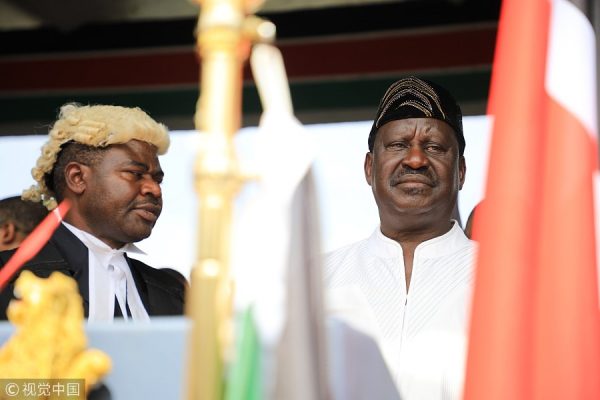
Kenyans stress importance of law after Odinga “swearing-in”
The Kenyan government branded opposition leader Raila Odinga’s “swearing-in” in Nairobi on Tuesday illegal, with the Attorney General saying the move is punishable by death.
The oath-taking ceremony was marred by confusion, despite Odinga calling it historic. He said he is representing the “People’s Republic of Kenya”.
“Today we have just begun the journey of liberating this country from shackles of bad governance, inequality and exclusion. This oath signifies our resolve to achieve electoral justice in the country,” Odinga said.
The government shut down four mainstream TV channels and several radio stations ahead of the event.
The swearing-in came as the country was just settling down after months of protracted political campaigns last year. President Uhuru Kenyatta unveiled his cabinet only four days ago.
Experts are calling for the two parties to engage in dialogue, saying the political differences can be settled amicably for the good of the country.
Kioko Ireri, an associate professor at the United States International University of Africa, said the uncertainties will have huge ramifications for East Africa’s biggest economy.
He believed that all parties need to follow the law to ensure the country is back on the path of stability and growth.
“Whatever is going on is unconstitutional. Every Kenyan needs to follow the law to ensure that we do not erode the gains we have so far made in the democratic space. Changes can only be made under the confines of the law to bring sustainable peace in the region,” said Ireri.
In a televised interview, outspoken political analyst Herman Manyora said inclusivity in the government will tame the situation.
“Many Kenyans are feeling disenfranchised and the two leaders need to sit and dialogue and ensure every Kenyan feels part of the government.”
George Kithi, a Nairobi-based legal practitioner, warned that Odinga’s swearing-in as president, though it could placate his ardent followers, risks undermining the rule of law and the country’s stability.
“What the opposition leaders and the general public should be asking themselves is whether subverting the constitution to achieve political goals will strengthen or undermine our fragile democracy,” Kithi said.
He emphasized that a structured dialogue between the government and opposition is key to ending the political stalemate gripping the country.
The political storm started after the Supreme Court of Kenya nullified the first round of elections held on Aug 8 and ordered fresh elections because of irregularities.
Odinga pulled out of the second round, calling for radical administrative reforms of the election agency, a call Uhuru, from the ruling party Jubilee Kenya, refused. Uhuru was declared winner of the Oct 26 repeat elections after garnering 98 percent of the votes cast.
He was sworn in for his last term on Nov 2, a move that intensified the opposition’s call for wide-ranging reforms and the swearing-in of Odinga.


